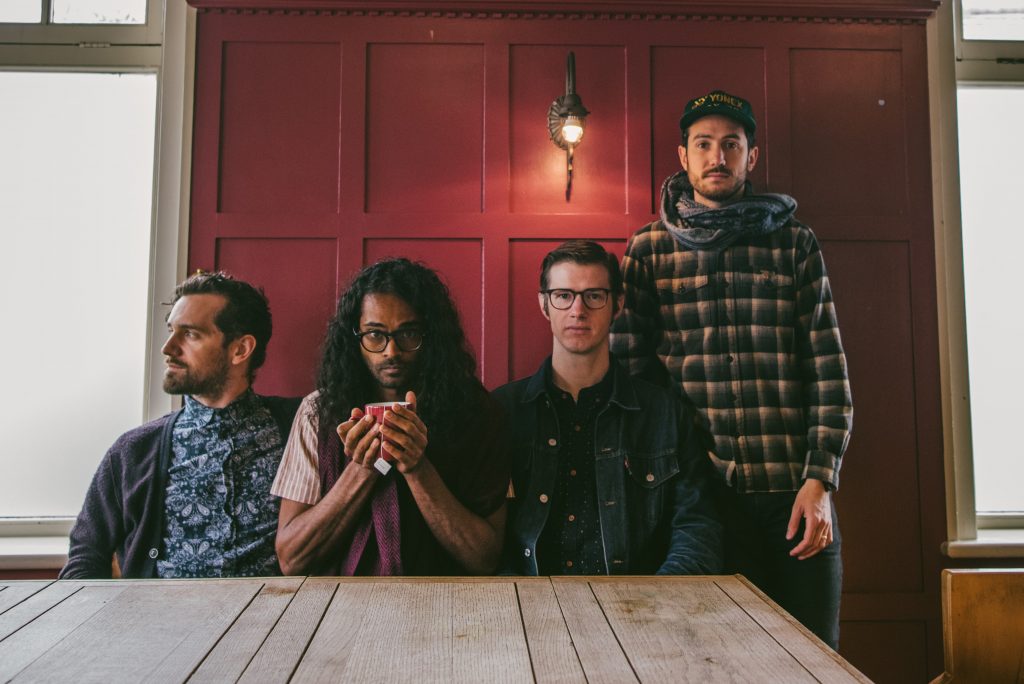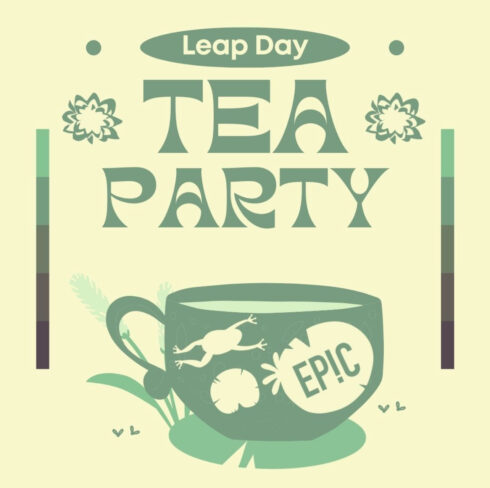On Monday, March 4, Jefferson Public Radio and the Oregon Center for the Arts at Southern Oregon University will present a concert at the SOU Music Recital Hall featuring Darlingside and special guest River Whyless.
Darlingside, comprised of members Don Mitchell, Auyon Muharji, Harris Paseltiner, and David Senft, is a Boston-based quartet that combines lush vocal harmonies, ethereal sound beds, and earthy acoustic instrumentation. NPR described the band’s 2018 album Extralife as “perfectly crafted,” and interpreted the band’s sound as “exquisitely-arranged, literary-minded, baroque folk-pop.” Darlingside released a follow-up EP titled Look Up and Fly Away on February 22, which features unused B-sides and ideas from Extralife.
The Siskiyou’s Connor Thompson spoke with Darlingside’s Don Mitchell to find out more about the new EP, their West coast tour, and their upcoming concert in Ashland. The following is a transcript of that interview.
Darlingside just released a new EP, titled Look Up and Fly Away, as a follow-up to your 2018 album Extralife. What was the process of creating this latest project like?
These were a lot of songs that we started around the same time [as Extralife]. But, for whatever reason, some of these were taking their sweet time and we had to give them a little more space before we could finish the lyrics and put them out. Other ones, we had written and felt like they didn’t fit with some of the other songs on Extralife. They started going in this cosmic, post-apocalyptic lyrical direction. We ended up choosing to finish those songs as a group. But meanwhile, some of those other songs, not for a lack of excitement, we decided to put on the back burner for a few months.
As soon as we finished Extralife, we came back around and finished a few more songs, and we started seeing them take on their own character. We don’t really think ahead of time what the album is about. In this case, we started noticing some themes in this one, and that definitely informed the lyrics and the title of the EP. But, in general, it wasn’t a very different recording process on the whole. Some of these tracks we even recorded literally in the same place at the same time [as Extralife].
NPR has described Darlingside’s music as “literary minded, baroque folk-pop.” Do you think that’s an accurate approximation of the genre of music you create? Or does genre even matter at all to your music?
I think it doesn’t matter to us, in the sense that if we start diverging from a certain path, we take that as a good sign that there is exploration to be done. We’re not afraid of going outside of something that someone has called us in the past or something we have called ourselves, even.
But, I would say that genre is certainly something that I use to process the music around me, and to try to understand what other songs a particular artist’s work is speaking to, influenced by, and where it fits in the cultural landscape. To that extent, I think when NPR described it that way I don’t think that it is wrong. We often just say we’re indie folk.
Sometime people will ask me, “what does your music sound like?” And I’ll often try to relate it to things that I suspect that person will like, so that they will give it a listen. [laughs]
What were some of the artistic influences, musical or otherwise, that gave you inspiration in creating this EP?
Being on the road as much as we have been the past few years, the influences we’ve had are other artists that we have toured with or played at festivals with. We did some dates supporting Brandi Carlile, and we ended up recording a couple of the tracks that are on this EP with someone from her team who has recorded with her before. So I think there’s a little bit of Americana influence that came back around in this EP. We also toured a lot with Henry Jamison, so often times we’ll ask ourselves, “what would Henry do on this?”
Maybe it’s a lack of time. I used to spend more time back in the day scouring the internet and seeing what was cool, what was being talked about, and what was moving people. I do less of that now, and I think that’s partly because there is an embarrassment of great music that is around me all the time on tour. And I think that’s probably the case with the other guys, too. We spend less time seeking out new music and it keeps finding its way to us anyway, because of all the festivals we play and things like that.
In concert setting, you guys have an unorthodox set up for an indie folk outfit; the four of you sing into a single mic. What is the reason behind this choice?
About six years ago, we were a band with a drummer and we would sing into four separate microphones. Our voices would come back through the monitors so they could compete with the sound of the drums, and we would try to harmonize based on what we were hearing back through those monitors. It is a different sound than what the audience is hearing, but that’s what most bands do.
When our drummer was no longer able to tour with us, we started doing a few acoustic gigs, and for those we were thinking “what is the easiest thing we could do?” It just felt wrong to get up there with all of the usual stuff and take away the drums. So we asked ourselves, “what would it be like if we tried to make our rehearsals louder?” That’s what we would do when we were writing the songs; we would stand in the living room and face each other and stand real close. That was a really easy way for us to blend our voices and to harmonize.
So when we first started performing as a quartet, we thought, well one way we’ve seen a couple of other bands do it- usually bluegrass and folk bands- is to stick a microphone in the middle of that rehearsal and make it louder. We wouldn’t get any back in the monitors. The only thing we would hear is the sound of our own voices acoustically hitting each other right in the face from a few feet away.
The initial purpose was, let’s get back to basics. We met in a singing group back in college and we would write songs. Usually that happened in a really intimate space, like a living room. We wanted to bring that back, and that’s what we’ve been doing ever since then, trying to capture what voices do in a room in real time, and then fling that out to the audience at hopefully a louder volume.
Of course what’s tricky about that is if it’s loud in a room, we’re not really hearing much of what we are doing. So if there’s a loud bar in the back of the room or something, all of that can be louder than us. Sometimes that can be a struggle on a festival stage, for instance. Lately, we’ve been experimenting with what happens if we take our same stage plot and change it. We stand very close to each other and use the four of the same types of microphones we’ve been using, but we keep them all very tightly clustered.
As a national act touring the length of the West coast, you’ve chosen to stop in Ashland to perform at Southern Oregon University’s Music Recital Hall. What about Ashland is exciting or important to you as performers?
We had been hearing good things about Ashland for quite a few years. A lot of bands will pretty much go through Oregon and only play in Portland. We had the very fortunate experience of playing the Sisters Folk Festival when we first were getting started as a quartet. We had such a good experience there, we went back a second year and we were welcomed back into that community.
We’ve spent a decent amount of time since then visiting central Oregon and the Bend area. In doing that, we’ve gone through Oregon enough times that we ended up stopping at Jefferson Public Radio in Ashland on the way and performed a little acoustic set.
Since then, we’ve been getting messages asking “when are you going to come play a show in Ashland?” We kept putting it on our booking agent’s radar and saying “hey we spent a good amount of time in Oregon, and this town sounds really cool.” We’ve been mentioning that we want to play in Ashland, and it just kind of worked out on this tour. We’re delighted to be exploring more of the state of Oregon.
After finishing up this West coast tour with River Whyless, what’s next for Darlingside as a band?
We’re putting out Look Up and Fly Away as an interim project. There’s one track on there that was a B-side [from Extralife], and we had almost finished it. We cut some things from Extralife for the sake of thematic unity and runtime.
When we put the cap on the EP a couple of months ago, we immediately turned the page and started doing brand new stuff, trying to forge ahead and try some new things. We’ve started writing and figuring out what we want to say next. It’s a blank slate for us, so I think that it could go in any number of different directions.
We’re going to tour pretty hard this spring, and so we will have done most of the United States. Over the summer, we’re going wherever the festival circuit takes us, which is always fun. We’re even going over to Russia to play a festival there.
But, after that, it’s an open book. We’re trying to purposefully keep it pretty open because we’re not a band that writes very easily on the road. We need a lot of home time to make that happen. But, we’re looking to make the next album away from home, and also trying an approach where we write lyrics before any of the music this time.
We’re trying to shake things up in a lot of different ways, and see what happens.



